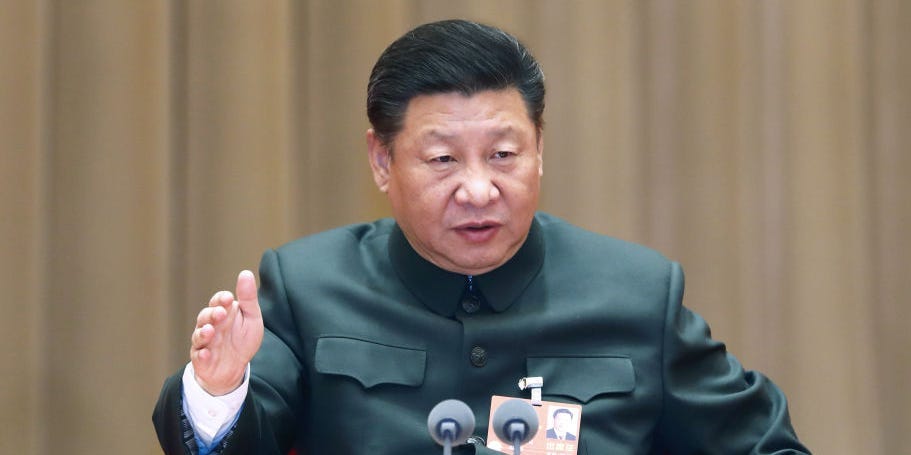
Li Gang/Xinhua via Getty) (Xinhua/Li Gang via Getty Images
- China is cracking down on another mainly-Muslim ethnic group, the Utsuls, according to the South China Morning Post.
- They are a group of around 10,000 who reside in Sanya, a city on the southern Hainan island, and are predominantly Muslim.
- Last month, Beijing banned the hijab and long skirt worn by Utsuls in schools and government buildings, according to party documents seen by the Post.
- The news comes as China continues to persecute Uighur Muslims in Xinjiang.
- Since 2016, at least 1 million Uighurs have been interned in hundreds of detention camps, where they are forced to adopt Chinese culture and sometimes work on production lines.
- Visit Business Insider’s homepage for more stories.
China has brought in new measures subjugating yet another Muslim ethnic group, the Utsuls, the South Morning Post reported this week, as the country continues to surveil and detain Uighur Muslims in Xinjiang.
The Utsuls, a group of around 10,000 who reside in Sanya, a city on the southern Hainan island, are predominantly Muslim.
Last month, the Chinese Community Party issued an order banning traditional Utsul dress — namely the hijab and a long skirt — in schools and government buildings, according to party documents seen by the Post.
The document was titled “Working Document regarding the strengthening of overall governance over Huixin and Huihui Neighbourhood,” referring to the two areas on Sanya in which most of the Utsuls live.

Isa Ma/Facebook
Among the new regulations are requirements for new mosques to be smaller, a vaguely-worded ban on buildings with “Arabic tendencies,” a ban on Arabic script on shop fronts, and a ban on placing the Mandarin characters for “halal” and “Islamic” on premises, the Post reported.
Bitter Winter, an Italy-based website that covers human rights in China, has also published a full copy of the regulations.
"The official line is that no ethnic minority can wear traditional garments on school grounds but other ethnic minorities [in Sanya] don't wear traditional garments in their daily life," an Utsul community worker told the Post.
"It makes no difference to them but to us the hijab is an integral part of our culture, if we take it off it's like stripping off our clothes," the worker added.

Google Maps
Small protests broke out last month in the two neighborhoods of Sanya where Utsuls live, the newspaper said, adding that a photo on social media "showed a group of girls wearing headscarves reading from text books outside Tianya Utsul primary school while surrounded by police officers."
China is erasing the culture of a number of ethnic minorities as part of President Xi Jinping's plan to create a unified China, where religion and culture come second to the Communist Party.
In Xinjiang, China's most westerly province, at least 1 million Uighur Muslims and other ethnic groups have been detained in hundreds of camps masquerading as "reeducation centres." There they are brainwashed and, in some cases, forced to work on production lines.

REUTERS/Lucy Nicholson
Detainees have been forced to sing propaganda songs for their food and repeat lines in praise of Xi. Reports have also shown that the Uighur birth rate has plummeted since 2017 as a result of forced sterilizations, child quotas, and forced abortions.
China says its policies in the region are defensible, and claimed without evidence last year that those detained have "graduated" and been released. Researchers have, however, found dozens of new suspected detention centers still being built or expanded this year.
China has also sought to erode the identity of the Hui Muslim population, China's third-largest ethnic minority.
A NPR investigation found that, since April 2018, Hui mosques have been shuttered, Hui schools razed, and many community leaders jailed in the Ningxia region in northern China, where most Huis live.
- Read more:
- China kept building new Uighur internment camps in Xinjiang after claiming that detainees had 'graduated,' report says
- China is reportedly sending Tibetans to work in military-style labor training camps, echoing the persecution of Uighurs in Xinjiang
- Disney filmed parts of 'Mulan' in China's Xinjiang, where millions of Muslims are being spied on and locked up
- My wife was detained, released, and disappeared again in China. Here's my message on behalf of my people, the Uighurs.
